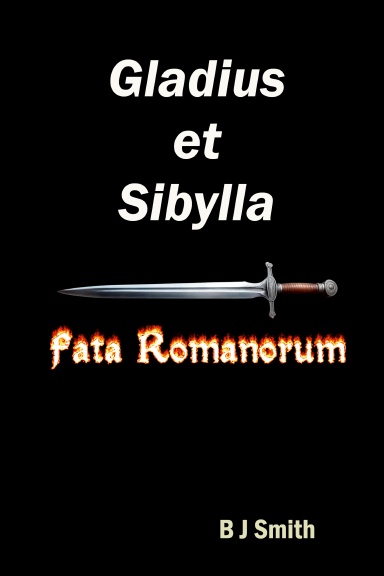
Gladius et Sibylla
Fata Romanorum
A sacred sword. A crumbling prophecy. The silence of the gods—and the fate of Rome hanging by a thread.
Set at the height of Imperial glory, Gladius et Sibylla: Fata Romanorum is the Roman epic that Rome never wrote—a sweeping, mythic journey into the heart of destiny, divine mystery, and civilizational twilight. As temples gleam and legions march, signs stir beneath the marble—a hidden current of omens, voices, and shadows long buried beneath civic splendour.
Aulus Marcius Regillus, a former centurion of the elite cohors speculatorum, is drawn from the streets of Rome into a world of lost scrolls, vanished priests, ancient inscriptions, and a weapon whose origins reach beyond the memory of men: Caliberis, the sword once forged by Vulcan, sanctified by Venus and Mars, and whispered to be the key to Rome’s fate.
But all is not as it once was. Can Rome still trust the voice that once guided it? The Sibyl speaks, but her words are veiled in shadow, and what once shone with divine light may now carry another fire. In temples, crypts, and sacred places, a deeper truth emerges—one older than the city, older than the gods themselves.
As signs multiply and fate begins to stir, Marcius is swept into a mystery that spans from the Forum to the underworld, from the rites of Etruscan tombs to the oracles of Greece and Egypt. Behind every whisper lies a question, and behind every silence, a secret. Not all that gleams is gold. Not every prophecy brings salvation.
Gladius et Sibylla is a novel of myth, sacrifice, ritual, and revelation, where the boundary between religion and reality collapses, and the future of an empire may hinge on one sword, one scroll, one choice.
Written in authentic Classical Latin, this novel blends the poetic resonance of Vergil, the psychological gravity of Tacitus, the sacred texture of Apuleius, and the narrative dignity of Livy—but speaks in a voice entirely its own.
▶ Ideal for Latinists, scholars, philologists, and lovers of ancient Rome, this is a prose epic where myth is not background—but action, belief, and fate itself.
▶ A tale of gods and mortals, destiny and silence, light and shadow—Gladius et Sibylla: Fata Romanorum is the last national epic of Rome, spoken in its own voice.
▶ Includes a rich Ad Lectorem section: a final philosophical and mythological reflection on Rome, fate, and the transition from the ancient world to the shadow of what comes after—a voice that lingers after the last line is read.
The door of prophecy stands open. Enter, if you dare.
Gladius et Sibylla
Fata Romanorum
Si umquam Romae sua fabula ultima fuit, si umquam carmen fatale non vates, sed civis Romanus scripsit, hic liber id esse potest.
Non hic leges fabulam levem aut commentariolum scholasticum, sed epicum prosae opus Romanum, Romano ipso sermone compositum. En oratio clara, plena, antiqua—non exanimis, sed ardens.
Aulus Marcius Regillus, miles vetustae cohortis speculatoriae, e silentio Suburae in arcanum fatum rapitur. Gladius quidam—non vulgaris, sed ipsorum deorum manu fabrefactus—iterum in lucem vocatur. Sibylla loquitur—sed num adhuc verum canit? Num lux omnis lucifera est? Num etiam numina ipsa iam avertunt oculos?
In hoc itinere invenies:
— sacraria vetera,
templa muta, arcana rituum;
— caelum quod orat, terras quae susurrant, daemones qui ex harena emergunt;
— Oraculum Trophonii, voces Egeriae, librum vetustissimum qui se ipse scribere
videtur;
— et gladium Caliberis, caelo fabrefactum, terrae datum, sanguine
signatum.
Non tantum historia hic traditur, sed ipsius Urbis fatum narratur—non per annales, sed per verba viva, per imagines quae animam tangunt.
Si amas linguam Latinam non ut rem vetustam, sed ut vivam atque spirantem; si deos veteres sentire vis non ut simulacra, sed ut praesentia; si vis Romam videre rursus oriri—et paulatim evanescere—hic liber tuus est.
Non initium discipulo, sed epilogus Romano dignus.
Sermo est Latinus altioris gradus—plenus idiomate Taciteo, colore Vergiliano, mysteriis Apuleianis, gravitate Liviana. Lectores quaerimus qui linguam Romanam amant ut Romani ipsi amaverunt: cum reverentia, cum intellectu, cum corde.
▶ Ad extremum addita est etiam pars Ad Lectorem, qua post ultimum versum ipsa fabula meditativa fit, et transitus a mytho ad memoriam, ab historia ad interpretationem philosophicam, lectori offertur.
Venisne? Ianua aperta est. Quid intus lateat, fortasse ne di quidem sciant.